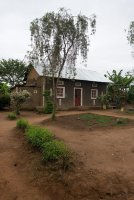
The silence was deafening that first morning in Kyotera. Sitting in one long row on the stoop, my family and I sized-up each other with covert glances. Grateful for my camera, I hid behind it waiting for them to do something, anything.
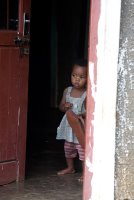
Kyotera is one of many small villages in Rakai. Mud huts nestled in a lush setting. Vibrant greens, the heady scent of rich soil, relative quiet pierced every so often by the calls of exotic birds, the sound of feet pattering along a path, and the tap, tap of a shepherd's cane herding his cattle to the next feeding spot.
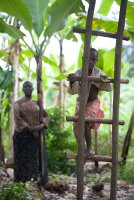
The landscape is dotted with mud and thatch huts surrounded by dirt lots swept often with reed switches. Every patch of green is cultivated in densely planted gardens. My family seems wealthy in comparison, with their multi-room house built by World Vision complete with concrete floor, cushionless chairs and sofa, and tin roof dotted with nail-sized holes.

As bored with our stand-off as they must have been, I stood up and began taking pictures of random things like chickens and laundry on the line. Slowly life resumed. Alice (age 20, head of the family) began checking the laundry. Rebecca (16) started splitting wood for the cooking fire. Matilda (20?) wielded a very long knife and peeled potatoes. The two 1-year-old babies hid behind trees, doorways, and mothers, crying every time we made eye contact.
When the school across the road came out for break, Bosco (11) strutted about, enjoying the attention his mzungu commanded. Every student had lined the road in front of the house and just stood there staring at me, edging a bit closer every minute or so until Alice would chase them back to the road. Slowly they would inch forward again. This went on for 20 minutes until the whistle was blown and they all ran back to the school.
The education mandate passed by the government in the '90s has been implemented in full. Schools are positively everywhere, each represented by one particular uniform color creating waves of brilliant hues ebbing in and out of the classrooms, billowing out onto the roads. Driving across the country, I would think to myself, this is the purple district. Ah, now we're in the blue district. Hmm. Pink. Wow! Yellow!
 Mzungu is my name now (white person). Once baby Lilian reached out and touched my arm, withdrew sharply, and resumed crying. Later in the afternoon, I returned armed with biscuits. She and I made peace over that, though Marss, her same-aged cousin remained skeptical.
Mzungu is my name now (white person). Once baby Lilian reached out and touched my arm, withdrew sharply, and resumed crying. Later in the afternoon, I returned armed with biscuits. She and I made peace over that, though Marss, her same-aged cousin remained skeptical.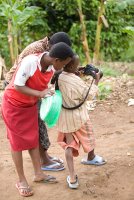
The family became much more relaxed. The following morning, before the throngs of neighbors and kids began stopping by, I allowed each of the family members to take a few photos of each other with my camera. This really seemed to break the ice and I finally began to capture the joy they had in their everyday lives.
Our last morning, I went to say goodbye. Each of the workshop participants gave the host family a plastic bin filled with basics like flour, meal, sugar, soap and some extras like pens, paper, crayons. Many of us found gifts waiting for us, as well. Astonishing to me in that we really had been nothing but an intrusion on them: perhaps only briefly elevating their village status by having mzungus hanging about. Alice, Rebecca and Matilda presented me with a large basket filled with a paw-paw and a large bunch of bananas. Both wrapped in banana leaves, tied with reeds, and decorated wtih bouganvillea.
 Robert, (17), walked to the meeting point with me to say goodbye. I gave him a picture of the girls I had left in my bag on the bus so he could show his sisters my daughters. (Just think, girls, your photo is floating about Uganda now!). Bosco and several of his friends held my hands, my shirttail, my pants... and waited with me while the other mzungus came out of various paths converging on the central meeting place.
Robert, (17), walked to the meeting point with me to say goodbye. I gave him a picture of the girls I had left in my bag on the bus so he could show his sisters my daughters. (Just think, girls, your photo is floating about Uganda now!). Bosco and several of his friends held my hands, my shirttail, my pants... and waited with me while the other mzungus came out of various paths converging on the central meeting place.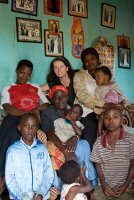
Comparing my experiences with others in the group, I question whether the households whose elders have died from AIDS are slowly losing their culture. My family was so different. Throughout the places I've been, men typically wear western-style clothes. Women wear dresses or long drapes of fabric mysteriously wrapped around them. The girls in my family wore western-style dresses and often pants. Never the traditional dress.
Others in my group observed many meals with the families, both in preparing and eating. Perhaps mine was too shy, too polite, or too afraid I would eat everything, but aside from the first morning when they were preparing lunch, I would not know if they ate at all.

The stories of families singing, dancing and playing drums made me envious. My family's entertainment was sitting outside their home talking with the steady stream of visitors stopping by.
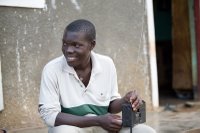 They would bring out the radio. Listening, dancing and singing along. I did capture them doing various chores: sweeping the dirt yard with reed brooms, washing down the porch and step, laundry. Rebecca would help Bosco with his schoolwork.
They would bring out the radio. Listening, dancing and singing along. I did capture them doing various chores: sweeping the dirt yard with reed brooms, washing down the porch and step, laundry. Rebecca would help Bosco with his schoolwork.I believe Alice must have been only 12 or 13 when they lost their parents to AIDS. Grandparents had also passed away. I can't help but wonder if the lack of elders parallels the absence of cultural tradition.
But, what I missed in culture in Rakai, I definitely found in my next stop: Kisoro!

3 Comments:
Wonderful - what a terrific experience for the Mzungu as well as the host family. I suspect that they are still talking about the lovely Mzungu and her three wonderful girls...a decent birder
omg i would have died... awkward silence is like hitting me in the face with a shoe... repeatedly. so good job overcoming that. :)
-your last born
Nice blog, hope you enjoyed Uganda as i can tell from your blog. Only wish to enlighten you abit. The children do wear western clothing because it is the cheap from the second hand market or to say affordable compared to tailored.And as i see from some of the photos, they probably wore sunday best for the duration of your visit. Culture is not lost.
Furthermore, it was really sad the family did not sit and eat with you probably they were embarrassed and didnt think you could handle sitting /kneeling down on a mat for a meel for upto 30 minutes. oe else they did prepare for you meals but only what was available for them was one meal a day and prefered not to expose their poverty. Happy blogging
sweet ugandan
Post a Comment
<< Home